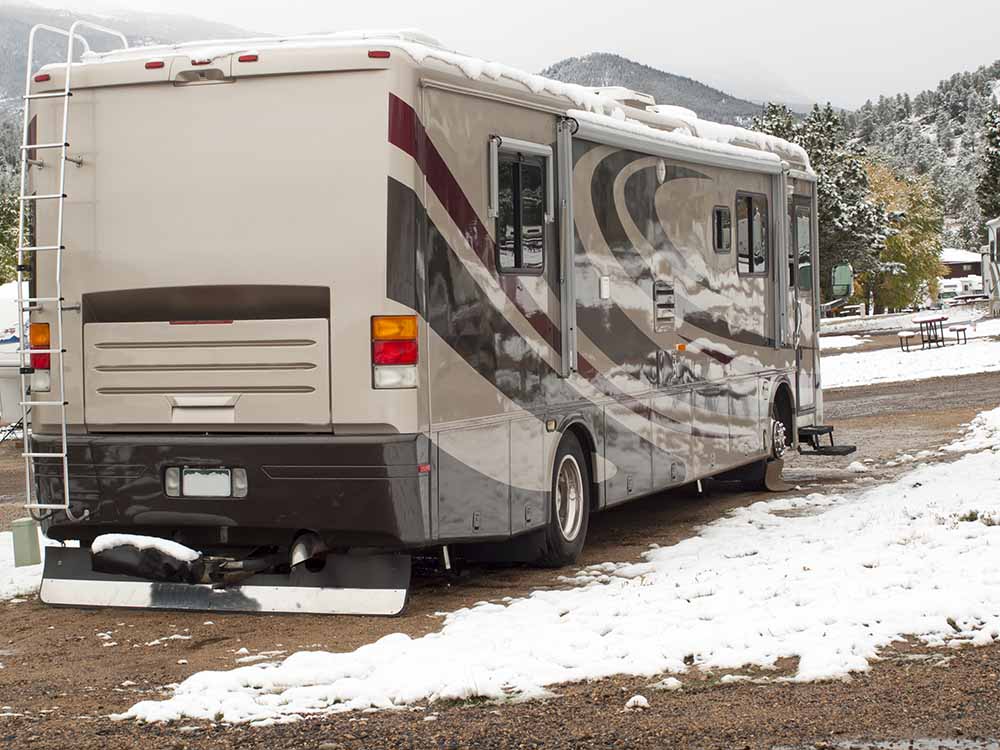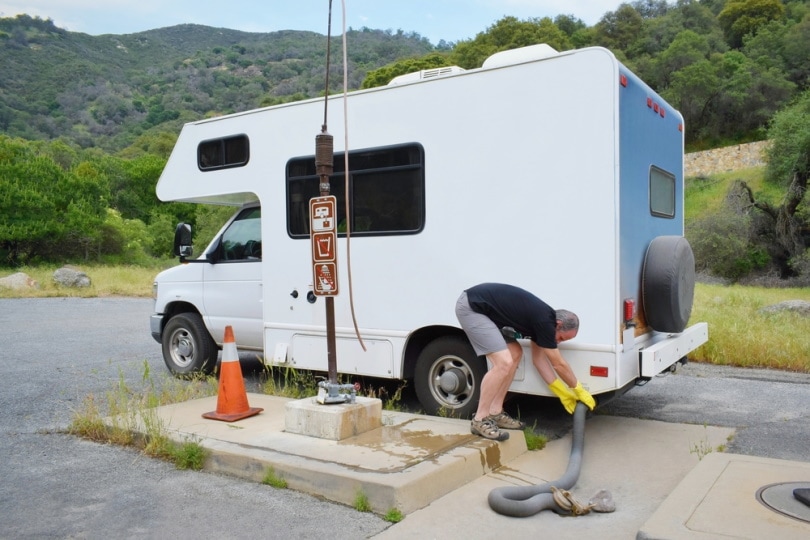What Size Generator Do I Need for my RV? Factors & FAQ
-
Greg Iacono
- Last updated:

Exploring the world with an RV is exhilarating, fun, and a growing trend in many countries. Many people today are living full-time in their RVs as the tiny house movement grows. While most RVs already have a generator to generate needed electricity, some don’t. For those that don’t, purchasing a generator is a good idea, especially if you plan to stay overnight where you won’t have access to an electrical hookup. Even if your RV has a generator, you might want to purchase an additional generator when you need more power.
If you’re contemplating a generator purchase, you might ask, “What size generator do I need for my RV?” The generator you need depends on the amperage and the voltage of your RV. A fast method to determine the size you need in your RV is to multiply volts by amps. Since most RVs are 120 volts, you only need to know the amps that your RV provides. Most are either 30-amp or 50-amp.
- 120 volts x 30 amps = 3,600 watts.
- 120 volts x 50 amps = 6,000 watts
In other words, an RV with a 30-amp feed would do well with a 3,600 to 4,000-watt generator. An RV with a 50-amp feed would be fine with a 6,000-watt generator. However, most RVs with 50-amp feeds have two of them. That means you would need to double your wattage to 12,000 watts if you wanted a generator that would handle all your electrical needs.
Now that you know what size generator you need for your RV, it’s likely you have more questions about RV generators. For example, can a generator be too big for an RV, and how many watts does an RV air conditioner use? We have the answer to those questions and several more below, along with tips and advice that you may find very helpful.
What Size Generator Is Best for the Different RV Categories?
RVs come in four varieties, including Class A, B, and C and 5th-wheel RVs. The difference between them that’s important to consider is not just the size but the number of electrical appliances and other electrical equipment each type usually comes with. A class B van, for example, usually has anA/C unit built into the engine, while a Class A RV can have up to 3 of them on the roof. That’s a huge difference in the amount of electrical power needed; thus, a Class A RV will need a much higher wattage generator.
- Class B Van = 2,000 to 4,000 watts
- Class C RV (1 AC unit) = 3,000 to 4,800 watts
- Class A RV (2 AC units) = 5,500 to 8,000 watts
- Class A RV (3 AC units) = 10,000 to 12,500 watts
- 5th Wheel RV (2 AC units) = 5,500 to 8,000 watts

Can a Generator Be Too Big for an RV?
Depending on the size of your RV, your electrical needs, and your usage habits, buying a generator that’s too big for your RV is possible. Remember that the bigger a generator, the more it weighs and the more space it takes up inside your RV when traveling. Also, a more powerful generator will emit more noise and use more fuel than a smaller one. While getting a generator that’s too powerful for the job may seem logical, it’s best to stay within the ranges we provided earlier.
How Many Watts Does an RV Air Conditioner Use?
The number of watts an RV air conditioner uses depends on the appliance’s cooling output, which is measured in BTUs (British Thermal Units). For example, a 1,000-BTU RV air conditioner will use approximately 100 watts of electric power. If your AC unit puts out 10,000 BTUs, it will use 1,000 watts; if it puts out 15,000 BTUs, it will use 1,500 watts. In other words, divide the BTU output of your RV’s AC unit by 10 to find the wattage necessary to run it. (BTUs ÷ 10 = Wattage used)
Can I Use a Regular Generator for my RV?
This question is for those who have an RV without a built-in generator and thus need a portable (“regular”) generator to produce electrical power when away from an electric source. The answer is yes, a regular generator will work fine to power your RV, travel trailer, van, or 5th-wheel. However, you might need an adapter to plug your RV’s electrical system into the generator.
Also, it’s vital that you place your generator at least 20 feet from your RV when it’s in use. It should be on a stable base, far from anything flammable, and with the exhaust pointing away from your RV.
Should I get an Inverter Generator for my RV?
Most experts recommend getting an inverter generator for an RV because they provide what’s known as “clean power.” These generators work by converting alternating current (AC) to direct current (DC) and then back to AC once again before the electricity is fed to your RV’s electrical system. This back-and-forth electrical dance, so to speak, eliminates the risk of dangerous electrical surges, which is why their power is called “clean.”
Because of this advanced tech, you can run an inverter generator all day without worry, and, better still, it will accrue less wear and tear than a traditional generator used for construction jobs. Not only that, but you can run inverter generators at lower speeds to save fuel and operate with less noise, a huge plus when you’re out in the wild or trying to sleep at night.

Does a Travel Trailer Need a Generator?
Travel trailers typically don’t come with a generator and, depending on what you plan to do and where you plan to stay, usually don’t need one. For example, if you stay in an RV park and rent a space with an electrical hook-up, all you need do is plug in your travel trailer and you’re all set. Your travel trailer might also have a built-in generator or might not have any electronics that need power, both of which would negate the need for one.
When do you need a generator for a travel trailer? If you plan to live for an extended time in your travel trailer or stay where electrical hook-ups aren’t available, a generator would be a convenient appliance to have on hand. Also, if you haven’t purchased a travel trailer yet, RV experts recommend buying one with a built-in generator, which is the most convenient.
Can You Run an RV Generator at Night in a Campground?
Often, you’ll need electrical power all night in your RV, especially if you’re RVing in the winter. As to whether you can run a generator at night in a campground, it is safe to do so if you’ve followed safety precautions. Most generators will easily run all night on 1 to 2 gallons of fuel.
However, it also depends on the campground, some of which might have rules against running a generator at night during specific “sleeping hours.” If the campground where you’re staying says no, you’ll have to turn off your generator based on their rules and hours. If you’re wondering whether you can sleep with a generator running, the answer is yes, as long as it’s been set up safely and the campground allows it.
Final Thoughts
We hope you now have a better idea of the generator you need for your RV. As we’ve seen, it depends on the type and size of RV you own, its voltage and amperage, and the number of watts you need to power your RV adequately. The bigger the RV, the more electronic components it will usually have; thus, the more powerful the generator will need to be (and vice-versa). We’ve also learned that an inverter generator is a better choice for an RV since it produces clean electricity, uses less fuel, and makes less noise. If you’re purchasing a generator for your upcoming road trip, we wish you safe travels and a fun, exciting, comfortable time living the RV life!
- https://trailandsummit.com/does-a-travel-trailer-need-a-generator/
- https://trailandsummit.com/does-a-travel-trailer-need-a-generator/
- https://www.mortonsonthemove.com/what-size-generator-for-rv/
- https://learnmetrics.com/how-many-watts-amps-does-a-rv-ac-use/
- https://lifeonroute.com/inverter-generator-for-rv/
Featured Image Credit: Arina P Habich, Shutterstock
Contents

